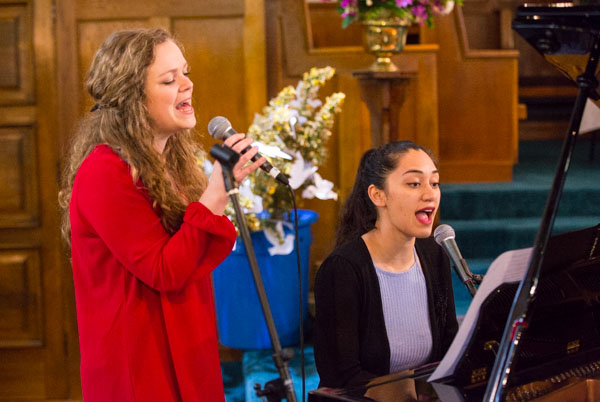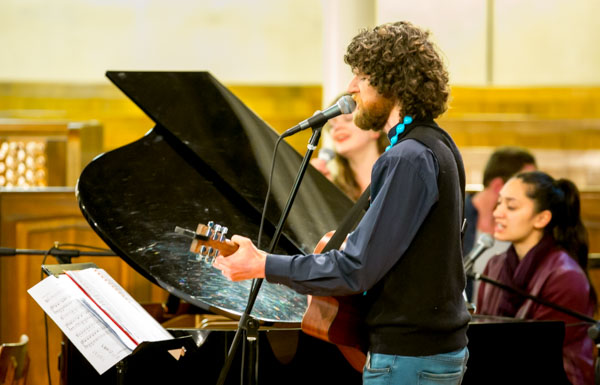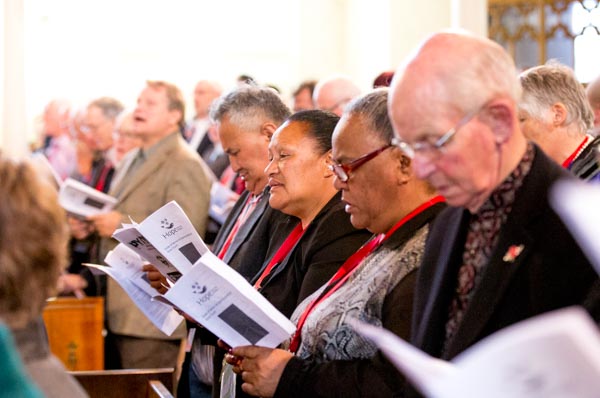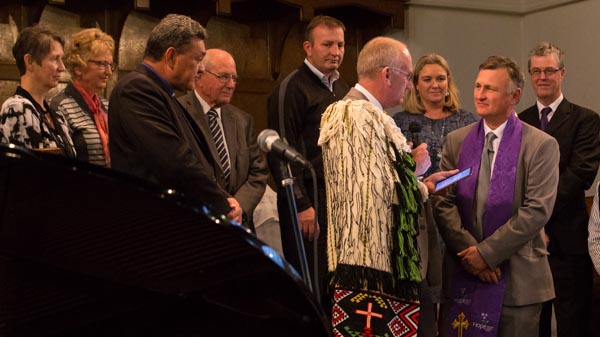The Presbyterian Assembly in Aotearoa New Zealand featured some wonderful music that as new for me, and some rich prayers, led by Malcolm Gordon. You can download the resources for free here.
NZ Baptists’ Children & Family Ministry
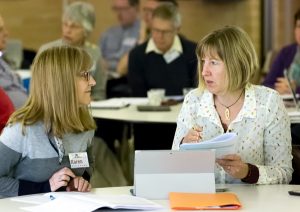 In Auckland I visited Karen Warner and Rachel Roche. Karen is the National Team Leader for Baptist Children & Family Ministries. Rachel is conducting research on behalf of Carey Baptist College and also involved in their ministry formation program. I had recently met Karen and Rachel at our “Reimagine Faith Formation” events in Sydney with John Roberto last August. It was great to see them again and we had a wonderful chat.
In Auckland I visited Karen Warner and Rachel Roche. Karen is the National Team Leader for Baptist Children & Family Ministries. Rachel is conducting research on behalf of Carey Baptist College and also involved in their ministry formation program. I had recently met Karen and Rachel at our “Reimagine Faith Formation” events in Sydney with John Roberto last August. It was great to see them again and we had a wonderful chat.
A New Zealand Children’s Ministry Network has developed among the Baptist, Presbyterian and Anglican Churches and Scripture Union. It exists for mutual support, planning and resourcing. The Bible Society and Messy Church are also part of the network. One of the positive developments is the sharing of training geographically – training events being offered by one member are advertised across all networks. A number of them participated in the Australian “Leaders To Go” Conference in 2015 and this encouraged them to strengthen their national networking across the churches and para-church organisations.
The Baptist Children and Family Ministry website is here. They seek to resource churches through the website, the bimonthly Baptist magazine, a BCFM quarterly newsletter, a monthly email, national gatherings, local cluster groups, and a closed ecumenical Facebook group. They work across 7 regions and have 3 regional coaches.
We talked about a whole range of similar interests – the potential of being an intergenerational church (and the puzzle of why this has surfaced now), the North American “Faith Forward” initiative, looking to engage beyond Sunday mornings, opportunities for engaging children and families with digital technologies, healthy/safe church training, etc. We also talked about their links with Baptist Youth Ministries.Continue Reading
Presbyterian Youth Ministry
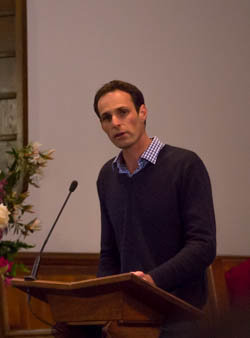 In Auckland and then in Dunedin, I met up with Matt Chamberlin, Presbyterian Youth Ministry Co-ordinator. Matt works with Gordon Fitch in PYM and connects with 5 staff (full-time and part-time) in pakeha/palangi synods across New Zealand, plus the Pacific Island Synod and the Maori Synod. PYM has regional youth committees who relate with the regional staff.
In Auckland and then in Dunedin, I met up with Matt Chamberlin, Presbyterian Youth Ministry Co-ordinator. Matt works with Gordon Fitch in PYM and connects with 5 staff (full-time and part-time) in pakeha/palangi synods across New Zealand, plus the Pacific Island Synod and the Maori Synod. PYM has regional youth committees who relate with the regional staff.
Their website is here.
PYM is involved in training, resources and events. PYM is seeking to develop a focus on discipleship that is Christ-centred and grounded in practices that grow disciples.
Stepping Stones of Formation is offered to help leaders plan ways to grow young people over times, and covers Belief, Practices, Justice and Life. In each area, PYM offers a suggested range of resources for different age groups and a planning tool.Continue Reading
Visiting the General Assembly of the PCANZ
I am in New Zealand representing the Uniting Church at the General Assembly of the Presbyterian Church of Aotearoa New Zealand. It is the first time that I have been an ecumenical guest at a meeting of a partner church. The photo is the installation of Rev Richard Dawkins as Moderator. This first post is my address to the Assembly on behalf of the UCA.
Kia Ora and G’day
Moderator and members of the Assembly
I bring you greetings in the name of Jesus Christ and the God who formed us, who calls us, and who transforms us to be part of God’s new creation.
As is our custom in the Uniting Church, I wish to offer my respects to the First People of this land and acknowledge your culture and for your care for Aotearoa for generation after generation. I pray for your well-being as First Peoples and for the continued sharing of your wisdom in this land and in this church.
I bring you greetings from our President of the Uniting Church, Stuart McMillan, our General Secretary, Colleen Geyer, and our national Assembly.
I’m delighted to have the privilege of participating in your Assembly on behalf of the Uniting Church in Australia – to share time together in friendship with you, to worship with you, and to listen and learn as you discern what it means to be a people of Hope in our world.
I wanted to let you know that last Monday morning our President called your past-Moderator Andrew to express our deep concern about the earthquake. He also sent a message calling our church to be in prayer for all those affected. I know that he would want me to assure you of our prayers and friendship at this difficult and traumatic time.Continue Reading
Why on Earth do you still read the Bible?
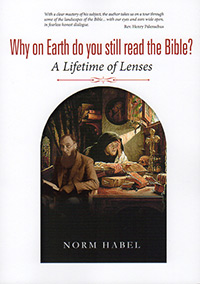 The Bible is the best and most challenging of books. You breathe it in. You’re shaped by it. You question it. You wrestle with it. At times you hear God as clear as a bell in it. At other times you can’t believe what you read, let alone connect it with your life. Many, many people have left churches because their life experience doesn’t connect with what they are being taught about what the Bible says. Retired Professor Norm Habel has provided a gem of a life story of how his reading and study of the Bible has changed and grown.
The Bible is the best and most challenging of books. You breathe it in. You’re shaped by it. You question it. You wrestle with it. At times you hear God as clear as a bell in it. At other times you can’t believe what you read, let alone connect it with your life. Many, many people have left churches because their life experience doesn’t connect with what they are being taught about what the Bible says. Retired Professor Norm Habel has provided a gem of a life story of how his reading and study of the Bible has changed and grown.
“Why on Earth do you still read the Bible?” is subtitled “A Lifetime of Lenses.” Norm’s book is a wonderful and challenging introduction to interpreting the Bible (hermeneutics). It is a story told through his life experience – 76 years in 100 pages. His personal story covers his family’s farm, seminary, teaching, church politics, culture (indigenous Australian and Indian), nature, and much more. In terms of interpretive lenses, he addresses multiple viewpoints – devotional, doctrinal, contextual, literally, symbolic, multi-source, indigenous, ecological and more.
Not surprisingly, given his scholarship, there is a focus on the Hebrew Scriptures or Old Testament. Norm’s cultural and ecological interests won’t be a surprise for those who know of his work. I first heard of him when I bought a book of his poems and prose in the early 1980’s, long before I knew that he was a professor. In his book as in his life, Norm runs the gamut from poet to prophet to professor to pray-er. He has been a gift to the church and hence a thorn in its heel at times (particularly his home church, the Lutherans).
I highly commend this book. It is well written and easy to read given the depth of its material. It is immediately useful in any hermeneutics class. I’d like every preacher to read it. While the book and chapters are brief, for many church members it will be a dive in the deep end unless they already have a sense that the Bible is more than what they think it is when they open it up. But that’s precisely what this gem of a little book should encourage people to do.
Thanks to Hugh and MorningStar Publishing for gifting this to us.
